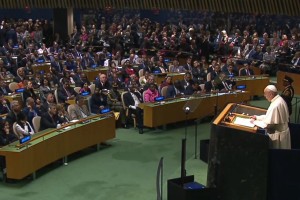 World leaders broke out into applause 27 times during the Pope’s address to the UN General Assembly last week, including when he called for the defense of the “right to life,” and called the family the “primary cell of any social development.”
World leaders broke out into applause 27 times during the Pope’s address to the UN General Assembly last week, including when he called for the defense of the “right to life,” and called the family the “primary cell of any social development.”
Pro-life and pro-family advocates welcomed the speech as an improvement upon the more subtle references to their causes during the Pope’s address to the U.S. Congress. Culture of Life President Robert Royal called the UN talk a powerful and explicit defense of human life and natural marriage even though the words “abortion” and “homosexuality” were not used. Royal is on the board of C-Fam, publisher of the Friday Fax.
At the UN, Pope Francis gave several examples of how to apply the four principles of Catholic social teaching–the common good, solidarity, subsidiarity, and human dignity–which he mentioned explicitly during his talk to Congress. Regarding subsidiarity, he argued for the “primary right of the family to educate its children,” and a rejection of “an all-powerful elite.”
He condemned “ideological colonization” as he had done in the encyclical Laudato Si, in a reference to basing aid to poor countries on their acceptance of population control and other focuses offensive to their people and against domestic laws like homosexual rights.
Throughout his address, the Pope wove together his signature defense of the environment the need to end social exclusion and build solidarity. Several times throughout the 40 minute talk he linked the biology of human beings to that of nature. “Any harm done to the environment, therefore, is harm done to humanity,” the Pope said. In Cuba on Monday, he called abortion of disabled babies an example of the “throwaway culture,” what he called at the UN “a quietly growing culture of waste.”
At one point the Pope indicated that the defense of life must precede talk of the environment: “The common home of all men and women must continue to rise on the foundations of a right understanding of universal fraternity and respect for the sacredness of every human life,” including “the unborn” and adding that it should “also be built on the understanding of a certain sacredness of created nature.”
Likewise he linked defense of natural marriage to nature itself. While extolling the UN’s codification of law into written documents as one of the UN’s most “important common achievements,” he invoked natural law, what he called the “a moral law written into human nature itself, one which includes the natural difference between men and women,” as also demanding “an absolute respect for life in all its stages and dimensions.”
Conversely, he lamented the promotion of “false rights” and said “no human individual is or group can consider itself absolute, permitted to bypass the dignity and rights of other individuals or their social groupings.” In this he echoed his predecessor, Pope Benedict XVI, who referred in his 2008 UN address to the attempt to pit human rights, such as those of a mother and child, against each other in a false competition that left elites to decide which trumps.
While the Pope mentioned explicit policy prescriptions such as the Sustainable Development Goals and the upcoming climate change talks in Paris, he did not specifically endorse them. Rather he called them a sign of “hope.” He warned against the “empty chatter” of setting goals but making no real difference in the lives of “real men and women who live, struggle, and suffer.”



